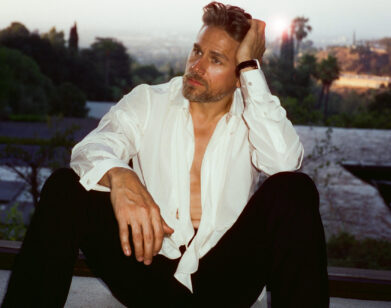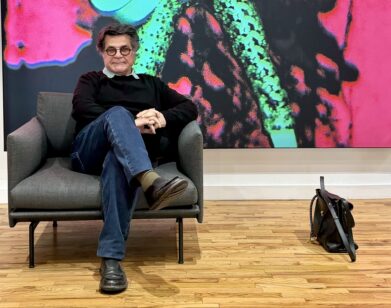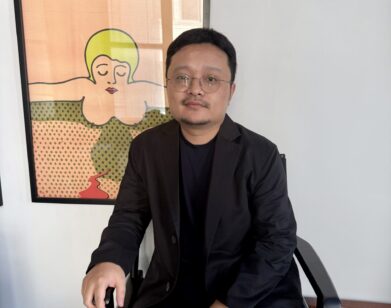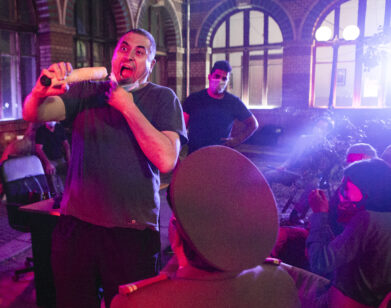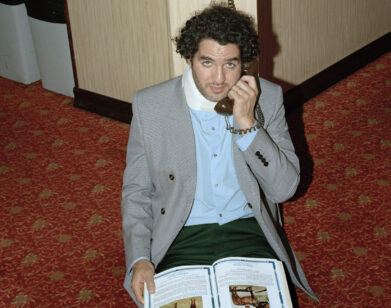Rebecca Thomas’ Electrick Youth
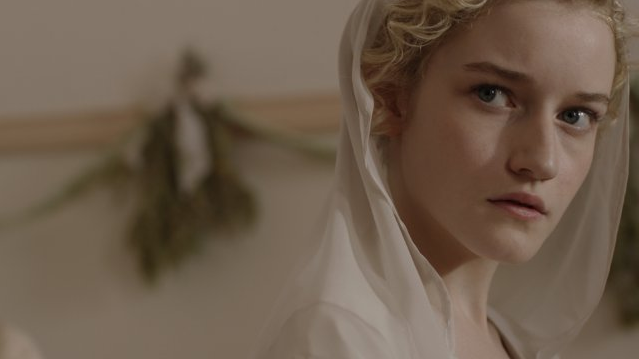
ABOVE: JULIA GARNER IN REBECCA THOMAS’ ELECTRICK CHILDREN. IMAGE COURTESY OF PHASE4 FILMS
Rebecca Thomas’ feature debut, Electrick Children, is a gossamer dreamscape of middle-class teenage discontent. Shifting from Utah’s prairie and its crepuscular, gaslit interiors to Vegas’ neon make-believe, the movie follows 15-year-old Rachel (Julia Garner), who raised in a fundamentalist Mormon family and community, runs away after discovering she is pregnant by immaculate conception. Believing that the voice on a tape is her “Joseph”—actually, a Nerves cover of Blondie’s “Hanging on the Telephone”—she sets out to find him.
But Rachel’s journey only takes her from one secluded world to another. She meets a group of restless suburban teenagers whose boredom is typified by the repetitive sound of skateboards carving concrete at a nearby park, or by how much time is spent avoiding going home. Like Rachel, they too are at odds with their parents, testing boundaries and itching to break free. Like Rachel, their innocence is met with adolescent abandon and candor. One minute they’re playing drinking games, the next, they’re getting married. In some scenes, Garner’s inquiring smile, flaxen hair, and floor-length dress stand in such contrast to her new friends with their guitars and grungy clothes that she looks like Wendy surrounded by her Lost Boys.
While the film opens with a foreboding tone, as though doom is lurking in the next room, Thomas steers clear of clichés, choosing instead to craft a much subtler, often sweetly comic story. We spoke to Thomas about growing up Mormon, her family’s reaction to Electrick Children, and how she created the gauzy look of the film.
DURGA CHEW-BOSE: Raised Mormon, how much of your experience influenced you when writing Electrick Children?
REBECCA THOMAS: I was raised mainstream Mormon in Las Vegas, so I had a TV and went to public school, and I had people who weren’t Mormon as my friends. The religion in the movie is my conglomeration of the research that I did on fundamentalist Mormons for pre-production work I was doing for a documentary, specifically about kids who got kicked out of their community. And obviously, there’s a huge overlap between fundamentalist Mormonism and mainstream Mormonism.
CHEW-BOSE: Has there been a backlash between more mainstream Mormons reacting to your portrayal of this particular Mormon sect?
THOMAS: Well, not yet, because it hasn’t been released here in the United States, but I am nervous about that.
CHEW-BOSE: There’s a magical quality to the movie, not just because of the way it looks and sounds, but how it’s paced.
THOMAS: Yeah, it’s definitely got these moments where it lulls…
CHEW-BOSE: Which keeps it dreamy. Which keeps it from feeing like a document of what it’s like to be Mormon.
THOMAS: Right. It’s a movie. It’s topical, but I didn’t mean for it to be a topical piece. But I am a little concerned about how Mormons will react.
CHEW-BOSE: The idea of immaculate conception from listening to a cassette tape is so instantly intriguing—had it been something you wanted to make a movie about for some time?
THOMAS: I wanted, for my first film, to adapt a Bible story, and I had studied the Bible and the Book of Mormon a ton, because I had served in a Mormon mission in Japan, so I spent a year and a half just studying the scriptures. And I really loved the Virgin Mary story, and I saw and also really loved Pasolini’s The Gospel According to St. Matthew. His approach was so non-judgmental. And I really don’t know where the rock-‘n’-roll element came from other than I really love that song performed by The Nerves.
CHEW-BOSE: While it is to a degree an adaptation of the Virgin Mary story, the portrayal I found most striking was of adolescence and what it’s like to be a teenager, to be bored and restless, and ultimately angry with your parents and influenced mostly by your friends, and by music and pastimes.
THOMAS: Yeah, Rachel finds her own version of rebelling as a teenager. I always say with this movie that her journey isn’t from A to Z but more from A to B or A to A.5, because she’s so young and coming from such an isolated place, there’s really only so much she can grow… I mean, I’m still coming of age!
CHEW-BOSE: What were the kinds of conversations you had with your art department and your DP, Mattias Troelstrup? The contrast between two completely different landscapes, Vegas and the prairie, was so finely done. Parts of scenes seemed to glow as if lit with refrigerator light.
THOMAS: We always talked about, starting from the script, that this was Rachel’s experience. We talked about how she would see the world and see light. Mattias and I spoke about how I’d written two places that naturally contrast, so we wouldn’t have to do much there. And at the settlement where we shot, there was no running water or anything, so our crew had to bring everything. And that place is a movie set waiting to happen. It’s a ghost town outside of Zion National Park in southern Utah, and some of my ancestors had lived there. It’s actually where some of Butch Cassidy and the Sundance Kid was shot—the bicycle scenes.
CHEW-BOSE: Oh wow. “Raindrops Keep Fallin’ on My Head!”
THOMAS: Yeah, we were really feeling it. We’re such film school students, so we were like, “We’re here! On this set!”
CHEW-BOSE: What were some of your influences when writing and imagining Electrick Children?
THOMAS: I really looked at the Wizard of Oz a lot when I was writing it, like a basic coming-of-age movie. I love how Dorothy uses her kindness and braveness to come back home. I wanted Rachel’s flaw to be that she’s young. So I looked at that character and the structure of that story.
CHEW-BOSE: Who would Rory Culkin’s Clyde be?
THOMAS: Oh my gosh, who would Clyde be?! I don’t know! But also, what else was I watching? The Graduate, and I even looked at Boogie Nights. And The Little Mermaid.
CHEW-BOSE: Growing up, was there a song like the one performed by the The Nerves that you just listened to over and over?
THOMAS: My dad listened to The Beach Boys, so that sort of colored my youth. Like the song “Kokomo,” I remember thinking it was such a dream, and I would memorize all the places in the song. And growing up, one of my pastimes was driving to the post office with my dad to pick up the mail, that was our thing that we did together, and he’d put on The Beach Boys, and we’d quietly drive to the post office listening while all this Las Vegas construction flew by us. I think The Nerves was very much in line with that feeling.
CHEW-BOSE: How has your family reacted to the movie?
THOMAS: Some of them have seen it. My mom watched it on her own and didn’t really like it, or at least felt defensive about it. My brothers and my parents are still practicing, and my sisters aren’t. And we’re all still very close, even though we’ve gone our separate ways. But my mom didn’t really talk about it with me and then later had a discussion with me saying, “It’s impossible for [Rachel] to have an immaculate conception, so it must have been the father,” and she was sort of grappling with it in that way, and I think she thought I was attacking her or my family. And then I invited her to come to AFI Fest and see it there with a big audience of 300, and the audience was laughing and crying, and she could see that I was trying to tell a story, and that it was about Joseph and Mary, and Joseph accepting Mary unconditionally. And then she cried, and told me she loved it. I think it took the shared experience of an audience.
CHEW-BOSE: What are you working on next?
THOMAS: I’m working on a thriller set in New York. I’ve been working on the script for about a year, and it’s called Miss New York. It’s about a grad student who finds her doppelganger, who happens to be Miss New York, and it gets her involved in the murder of another contestant in the beauty pageant.
ELECTRICK CHILDREN IS OUT IN LIMITED RELEASE TODAY.


